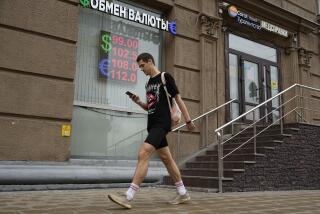Dollar Slides to New Low vs. Yen; Japan Intervenes
- Share via
TOKYO — The U.S. dollar plunged Monday on foreign exchange markets here, closing at 171.90 yen after dipping as low as 171.50, its lowest rate since World War II. The dollar slipped steadily in heavy trading in spite of reported daylong intervention by the Bank of Japan in support of the U.S. currency.
The single-handed attempt by the Bank of Japan to prop up the dollar, on Monday as well as last week on the New York market, indicated a rift on currency issues between Japan and other leading industrialized countries just two weeks before the opening of an economic summit here.
The dollar began trading Monday at 173.15 yen, 1.15 yen below its Friday close in New York and 3.95 yen below the Tokyo close last week. Both the opening and the closing figures were record lows. (The dollar closed at 171.05 yen in New York.)
Traders estimated that the Bank of Japan bought $1.5 billion in U.S. currency, as investors and exporters went on a selling spree. Trading here totaled $6.677 billion, a record high.
While the United States has let the dollar decline to improve the competitive position of its exports, Japanese leaders had recently expressed hopes that it would not weaken below 180 yen. Calculated by the International Monetary Fund’s formula, the yen has appreciated 41.1% against the dollar since last September.
In the past, the central banks of the five major industrial democracies have cooperated to drive down the dollar, but on Monday the Bank of Japan acted alone as it tried to stem the tide of dollars being dumped into the market.
Last Friday, the Bank of Japan was also reported to have bought $200 million worth of the currency in New York when the dollar sank to its previous low of 172.30 yen.
Foreign exchange dealers here attributed the dollar’s slide Monday to lack of market confidence in the immediate future of the U.S. economy and rumors that the Federal Reserve Board may lower its discount rate again, as well as a feeling that the Bank of Japan’s intervention alone would not be enough to stop the slide.
“The market evaluated the performance of the U.S. economy as good in retrospect, but it did not give the United States high marks for the future,” said Koichiro Kitade, foreign exchange dealer at Citibank’s Tokyo branch.
Dealers said that under normal circumstances they would have reacted positively to last week’s Commerce Department figures indicating a 3.2% expansion in the U.S. economy during the first quarter. However, news of high inventories and sluggish consumer spending forced them to be skeptical of the immediate future.
Traders last week apparently sold dollars in the expectation that the Federal Reserve Board would soon lower the discount rate to spur consumer spending. The board lowered the rate by half a percentage point to 6.5% on Friday. The Bank of Japan followed suit Saturday, cutting its rate by half a percentage point to 3.5%.
Meanwhile, the rising yen threatens to become a political and a diplomatic problem for Japan.
The Japanese government has been under pressure to come to the aid of large numbers of small companies that rely heavily on exports to stay in business. Demands for government help have been especially strong from the ranks of Prime Minister Yasuhiro Nakasone’s Liberal Democratic Party. Parliamentary elections are expected later this year.
At the same time, Japan has promised its overseas trading partners to restructure its economy to become less dependent on exports and more able to import goods from other countries.
Currency values and the restructuring of the Japanese economy are both expected to be major topics at the May 4-6 Tokyo summit, which will be attended by President Reagan, Nakasone and the leaders of Britain, France, West Germany, Italy and Canada.
More to Read
Inside the business of entertainment
The Wide Shot brings you news, analysis and insights on everything from streaming wars to production — and what it all means for the future.
You may occasionally receive promotional content from the Los Angeles Times.










